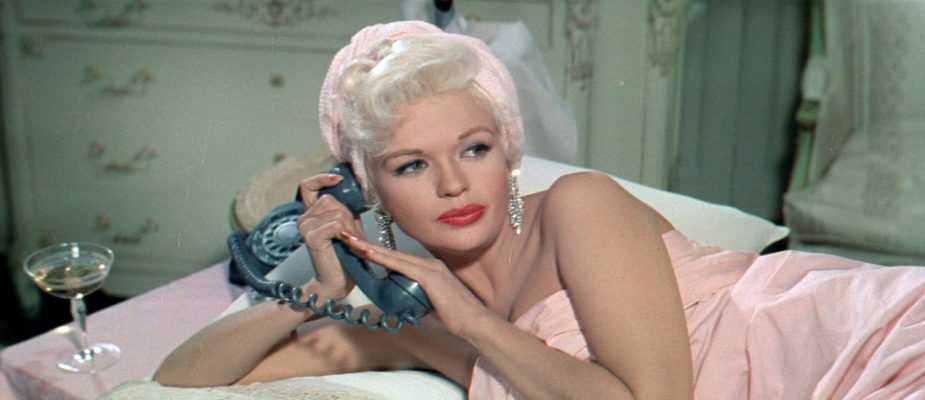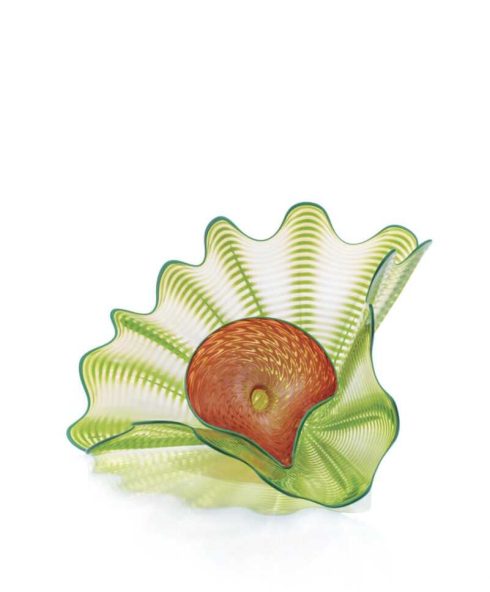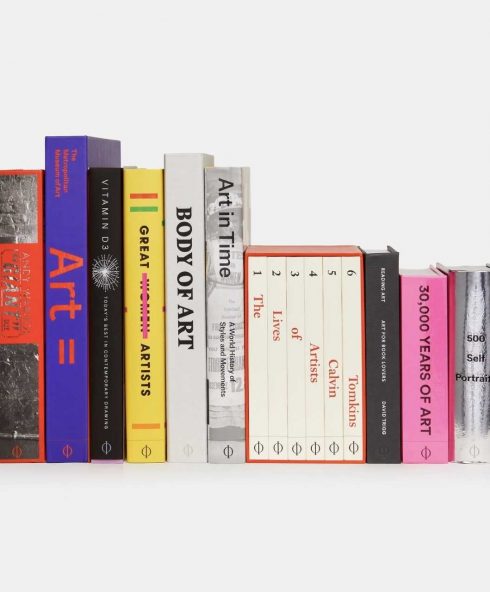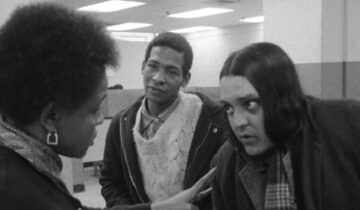Made less than a half decade after the introduction of color television, and long before the new technology had supplanted its black-and-white ancestor, writer-director Frank Tashlin’s full-color, Cinemascope masterpiece Will Success Spoil Rock Hunter? (1957) assails its visual storytelling competition. The key moment comes more than half way through the filmmaker’s spastically funny Madison Avenue-satire, when the titular Rockwell Hunter (The Odd Couple’s Tony Randall) follows a pause in the story by stepping out from behind heavy stage curtains. His purpose, as he informs his spectator, is to make the television viewer in the audience more comfortable. With that, the former animator’s monumental widescreen condenses into a small, rectangular black-and-white set, which rapidly loses resolution, as “snow” and a faltering vertical hold overtake the image—which is itself embedded in the masked and massive Cinemascope frame. Noting also television’s propensity for interruption, the small screen seems little competition for its gargantuan competitor’s larger-than-life scale and pristine image quality, for a medium that comes in quite handy for displaying starlet Jayne Mansfield’s otherworldly “assets,” as she lounges vertically across the screen.
Will Success Spoil Rock Hunter? similarly begins—following another self-reflexive passage where Rock references the director’s previous Mansfield vehicle, The Girl Can’t Help It (1956), in his vain attempt at remembering the new picture’s title—with a series of television ads that provide the hero with his unheroic profession (TV ad man), and the film with its satirical subject: not only television, but also 1950s consumer culture. In one spot after another, spotlighted in alternating corners of the big screen, presenters bring fake products to the film’s viewers, beginning with an ice box that can accommodate countless “lushes,” and concluding with a washing machine that literally sucks an overworked mother of “six dirty children and one filthy husband” inside it. The fifties that Tashlin brings to the screen, even in his ad breaks, is not the simplistic Acadia of the Nelsons or the Cleavers (though it is the sort of film that explains the anxiety that reactionarily spawned both), but rather a landscape of conspicuous consumption not seen in America since before the Depression (and even then, in a more mild form). Will Success Spoil Rock Hunter? presents a world in which everything is overheated and much too much.
This quality begins and ends not with the film’s consumer subject, but rather the picture’s female lead, the incredible Jayne Mansfield. In this, her second consecutive pairing with the auteur, she plays to her own sex-kitten celebrity, an image born of her world-shattering measurements and Playboy past—though Tashlin does allow the mask to slip as she and Rock discuss her in plot to make her boyfriend jealous, one that suggests an unexpected agency and intelligence. Jayne Mansfield is in essence a counterfeit or burlesque Marilyn Monroe to be sure, but she is so expert in this role in Tashlin’s films that hers becomes the more eloquent version, a parody of the culture that transformed the bustiest into its ideal of beauty. None of this, of course, is to take away from Mansfield who is better here than Marilyn almost ever is, save at least for the latter’s appearances in the films of Howard Hawks (Monkey Business, Gentlemen Prefer Blondes).
If Mansfield’s Rita Marlowe proves to be the ultimate product (at least her kissable lips and preposterously curvy figure) and the object for a nation’s id—the language of Freud is not out of place in a film that continually references therapy and name-checks the Austrian psychoanalyst specifically—it is instructive to consider who it is exactly who participates in the film’s celebrity culture. With Will Success Spoil Rock Hunter? it is not the rain-coated middle-aged man or the sad Miss Lonely Hearts who Tashlin brings to our attention, but rather masses of teen girls, led by Rock’s niece April, who pin the gorgeous “platinum blond… blond” star, as she corrects herself, to their bedroom walls, and who later attempt to lay libidinal waste to the star- and television-media-made Rock. Tashlin depicts an America in which teenagers are themselves voracious consumers, of everything from television to sex. (It should be noted that Will Success Spoil Rock Hunter? provides another example, in the filmmaker’s work, of a bachelor taking care of a teenager, a trope that he brought off masterfully in both Susan Slept Here (1954) and its approximate remake Bachelor Flat (1962), a film, in the latter case, which helped to usher in a new frankness in American cinema by fulfilling the promise of the director’s earlier, spiritually anarchic work.)
Will Success Spoil Rock Hunter? is indeed one of the director’s signature achievements, it is a Matissean pure-color masterpiece that incorporates any number of the filmmaker’s concerns and motifs, his semantics and syntax, from the intersections with youth culture described above to those that position a mid-tier salary man with Mansfield (cf. The Girl Can’t Help It) to the low-culture interfacing of Artists and Models (1955), and finally the movie industry satire (and uniquely reflexive fictional world construction) of Hollywood or Bust (1956). Will Success Spoil Hunter? is also the original, almost as boozy take on the same professional environment that Matthew Weiner’s Mad Men would send up in its own undeniably sexy, if at times mopily existential way. Tashlin’s hero escapes Madison Avenue through egalitarian, middle-class contentment rather than via Don Draper’s Age of Aquarius enlightenment. For this writer at least, cinema beats television (even in its quality, long-form pinnacle) yet again.
En route to a simple life on the chicken farm, Tashlin brings us bubble-baths filled with Playboy models, Tarzan knock-offs in skimpy loin cloths, jokes about polishing an Oscar and Rockwell’s biology, and the tear-filled attainment of life’s greatest achievement: receiving the key to the executive powder room. Tashlin’s past as animator materializes most spectacularly in the sequence that follows this final great moment in Rock’s life, as the stagecraft of the office comes to life to sing of Hunter’s culminating success—though he will soon accept his limitations noting, in one final sexual pun, that he is incapable of keeping his pipe lit.
A newly restored digital print of Will Success Spoil Rock Hunter? screens Saturday, June 17th at 8 pm as part of Museum Films’ original “Bachelors and Bombshells” program.










